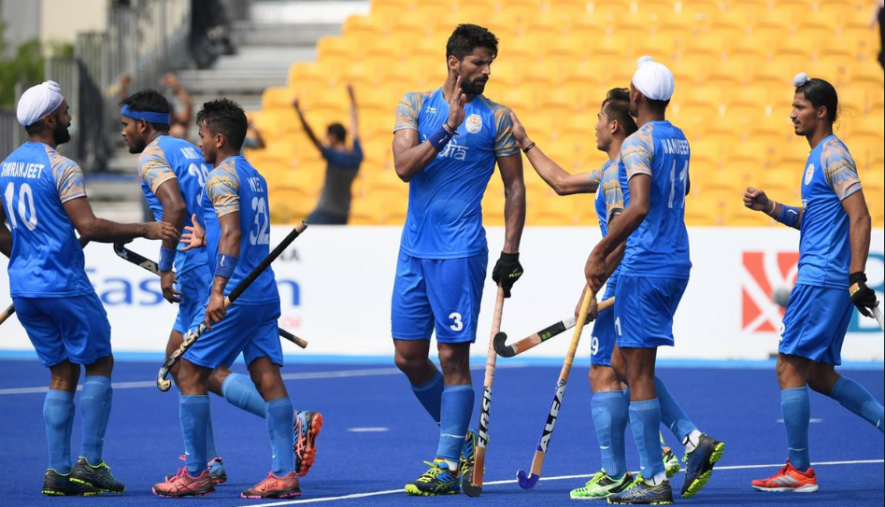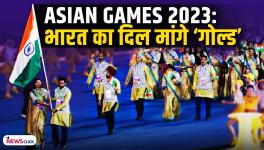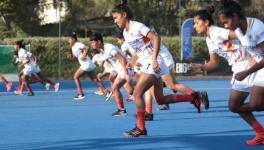Hockey ‘Expands’ at Asian Games, the Game Goes Down

Indian hockey teams scoring rampage at Asian Games 2018, in the lopsided contests at the continental event thanks to the increase in the number of teams in the fray, in tune Asian hockey’s idea of expansion (PIc: Twitter, Hockey India).
Globalisation, economics, broadcasting and the fight for increased audiences have forced sport’s hand. Modern sport isn’t simply about winning and losing anymore. It isn’t about Faster, Higher, Stronger either. At least not in the way the Olympic motto was originally conceived.
For sport to be considered successful, its economic sustainability is paramount. How much money can you make? How many people can you bring in? Who cares? This is the mantra. That’s why, for example, the NFL has been playing American football in London every year since 2007. And why one of its teams, the Jacksonville Jaguars, might end up owning the iconic Wembley Stadium located almost 7,000 kilometres from its home base. There was drama in Spanish football this year when La Liga players threatened to go on strike if games were moved in the opposite direction -- to attract the US’s burgeoning football audience.
In multidiscipline events, sport is as much a battle for survival. If your sport’s figures seen to be suffering, or if the sport is not seen catching new audiences, it runs the risk of being cut from the programme altogether. No one is exempt, as wrestling almost found out, to their peril. It is a situation hockey grappled with immediately after the London Olympics -- arguably the sport’s most popular edition ever.
Also Read | Corruption and Mismanagement Rule Indian Sport; Kabaddi's Story at the Asian Games Tells Us Why
And so, dutifully, hockey went about correcting their faults. An absurd number of rules have changed over the past eight years in the sport with an aim to make it more broadcast friendly (four quarters), viewer friendly (self starts, penalty shootouts) and player acceptable (video referrals). But on its own, these cosmetic changes aren’t enough.
And so, hockey, like other sports is on to its second stage of increasing the game’s visibility -- expanding the pool of nations that play it.
The Asian Challenge
For expansion, one of the key markets for hockey is Asia. The Asian Hockey Federation’s long term objective has always been to expand its playing base through the continent and in recent times the project has gained even more force.
“Our desire at the AHF, is to expand the number of countries playing hockey in Asia. At one level, it helps our own federation. The more the number of countries playing the sport, the more the visibility, and in the long run it will also help the global game,” said a representative of the AHF, who declined to be named for this piece. “Right now, 40 of the 45 OCA (Olympic Council of Asia) countries have started playing hockey, and soon we hope that all of them will be at a level to field teams in international competition.”
Also Read | Ranked Favourites But Tricky Gold Quest for Indian Hockey Teams at Asian Games
Keeping with the theme, the AHF expanded the hockey competition at this year’s Asian Games to include 12 from the previous 10. A certain amount of farce has followed.
Bizarre scorelines, double digit thrashings have been dished out to the new boys. An age old record crumbled on August 22 in Jakarta. India beat Hong Kong 26-0 in a group stage match of the men’s hockey tournament, demolishing the previous record of highest victory recorded by an Indian team in the sport. That earlier record belonged to the 1932 Olympic team, which beat the USA 24-1 in Los Angeles. The Indian team’s performance was brilliant and brutal.Tragic and comic. It was -- in millenial tongue -- savage, bro.
While the efforts of the AHF are well-intentioned, these scorelines don’t reflect a sport in good competitive health.
“A part of me agrees that this level of score line does display the best game of hockey and even worse [sic] for Indonesia (they were college kids) but then thinking about India, it could have been marketed to promote the game,” says Jimmy Bhogal, a hockey writer who runs the website Give me Hockey. Bhogal’s argument -- one that he has also frequently put across on Twitter -- is that despite the mismatched score lines, the expansion is good in the long run. “Conduct more tournaments at continental level, even if it is between weak teams, the more they play, more they improve,” he argues.
Also Read | Golden Freedom: Legacy of Independent India’s First Hockey Olympic Gold
The representative of the AHF makes the case for putting these teams simpler. “These teams have qualified for the Asian Games. Who are we to stop them from participating, if they have qualified and have sent the team?
This is an important distinction to make, regarding hockey. The Asian Games is an Olympic qualifier for hockey. And so, unlike the football competition at the Asian Games -- where any OCA member can seek entry -- hockey follows a qualifying process for participation. The top six teams from the previous edition gain automatic entry, and the rest play the Asian Games qualifiers for two further spots. In the Asian Games qualifiers held in March this year, eight teams -- four of who also play the AHF Cup, which is essentially the ‘2nd Division’ of Asian Hockey -- took part for the available five berths.
Also Read | PV Sindhu Breaks New Ground at Asian Games
Hong Kong and Kazakhstan, though, only qualified because China and Chinese Taipei decided not to send teams. The former have come off the worst--conceding 54 goals in their first four games -- with only one to show for themselves.
Arjun Halappa, Olympian and former captain of the Indian men’s team, has a simpler reading of the situation. “If hockey wants to expand as a sport, then some compromises have to be made. If we want to see only tough matches then it will be the same four or five countries. The world order will not change.”
Expansion Theory
Not everyone seems to be buying the expansion theory. There has been some biting criticism of the AHF’s plan and subsequent results. In a wide ranging Twitter debate David Balbrinie, the General Secretary of the European Hockey Federation has critiqued the the AHF while also, very gently, pushing his own credentials as an administrator.
His criticism, objectively, makes sense. Even as an Indian hockey fan I found my attention drifting away from the TV screen over the course of India’s record-breaking wins. They haven’t made for especially pleasant viewing (in side conversations we have also discussed the viability of a match up between Madhya Pradesh Hockey Academy and Hong Kong). Balbrinie’s idea of a dual (or triple) division system seems to make great sense (For the record, the AHF has a three tier system in place, which, in the words of the representative, ‘has been functioning for the past twenty years’).
Also Read | Meerut’s Pride: Gun Wielding Teens Add Sheen to Indian Show at Asian Games 2018
What makes it interesting is that Balbrinie was one of Narinder Batra’s chief opponents in the bid for the position of FIH president. Since the International Hockey Federation (FIH) was set up in 1924, Batra is its first non-European president. And, in all those years, the FIH, did very little to expand the game beyond European borders. Besides tapping India’s as a cash cow for international events, the FIH’s involvement in Asian hockey left much to be desired. While European hockey hosted and promoted its own leagues and competitions, the other federations -- partly through their own incompetence and partly because of the global body’s negligence -- fell by the wayside.
The AHF representative highlighted the inherent problems of being part of a multi-sport event because it means working under rules set up by a different set of administrators. “Being part of a multi-sport competition like the Asian Games, leaves us also under the purview of the Olympic Council of Asia,” he said. “Running a separate competition, like a qualifier, or a second division round is not permissible by them. This is a bit of a challenge for us. We want the competition to grow, and in these initial days, such setbacks will be seen.” The representative also said that the AHF is working on figuring out a format with the OCA that may knit the competition tighter over the next few years.
But will nations with relatively new histories in hockey be put off by these exaggerated defeats?
“I don’t think so,” says Halappa. “Look at cricket. When Bangladesh, or even Sri Lanka started playing cricket at the high level, everyone was thrashing them, scoring lots of runs against them. But all it required was one generation, or even half a generation of interest, a few results, and they have improved massively in quality.” The AHF representative concurs. “For some of these teams, the games for 11th place, 10th place will carry huge weight. We have to stop observing them from a top down view of the world. From their perspective, not finishing bottom will be a huge thing.”
Also Read | Gold Sweat: Vinesh Phogat’s Gritty Journey to Historic Asian Games Triumph
Expansion at the cost of quality though is a model everyone is prepared to follow through to the end, fuelled by the belief, that eventually the sport will benefit. The eyeballs that follow expanding the competition to more populations is valuable.
“Anything that brings hockey in to limelight in front of the world is a good score, even if the teams end up winning 30-0, at least people will take notice of it. Right now biggest threat facing hockey is that instead of being inclusive, hockey is becoming exclusive just like cricket,” Bhogal says. “The biggest problem is finance. Hockey does not have the money of football, cricket or even basketball.” Instead of a top-down approach, he says, member federations will have to figure out more localised ways to sustain and grow their operations. Featuring at continental events comes with some financial benefits for participating nations. So, while the huge margins of defeat might not do much for the self-esteem of the players on the receiving end, they might be just be sacrificing their egos at the altar of the greater good.
Get the latest reports & analysis with people's perspective on Protests, movements & deep analytical videos, discussions of the current affairs in your Telegram app. Subscribe to NewsClick's Telegram channel & get Real-Time updates on stories, as they get published on our website.
























